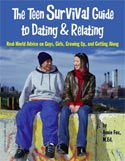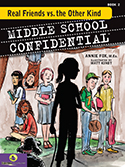Communication Problems:
“I'm worried that my husband is undermining my daughter's self-esteem.”
Hey Terra,
My 14 year old daughter is very mature and responsible, but I don't think my husband sees that. I think he is very proud of her and sees her capability on the soccer field for example, but at home, he is constantly cautioning her to "be careful", or "don't forget this", or "I hope you didn't say that to her face" and she response with "I'm not stupid, Dad!" or "I'm in high school now, you don't have to treat me like this."I think it is his over-protectiveness and cautious nature more than his lack of trust -- but I think it comes off as such. He has a very questioning nature (I find it stifling myself)- which can also lead to her asking to be left alone, or that she doesn't need his advice.
They also argue (sometimes my husband gets very childish about it). I think they both are stubborn and don't mind conflict. I try to tell him that we only have a very short time left with her and that we need to maximize it and avoid "trivial" conflict.
I've also told him that he needs to ignore some of her lashing out -- because it rarely is about him -- more about what may have happened during the day. I'm not advocating a "doormat" approach, but I think he needs to shrug off some bad behavior and ask "Why is she behaving like this? Where is she hurting?" The bottom line is -- I want both to respect each other and have a good relationship. I don't like seeing her feel so disempowered (if that's a word). Any ideas about what conversations I should be having with either of them?
Worried Mom
Dear Worried Mom,
Yes, disempowered is a word in my book. A girl needs her dad's approval. If she doesn't feel valued, trusted, and respected by him there's a good chance that she will turn to random guys for that male approval... Often girls who do this aren't all that particular about the guy they choose and what they do to get his approval. You don't want that to be your daughter's path!
The conversation you need to have is between you and your husband. You need to get on the same page because right now it sounds like you have one set of parenting objectives for your daughter (which I'm guessing include: developing a positive self-image, self-confidence, a sense of responsibility, and becoming a trustworthy accountable young adult), and he has another. When your husband allows his over-protectiveness to rule the day then he is undermining your objectives (which ought to be his too) while he's seriously undermining and negating your daughter's development.
When you say that you too find his questioning nature "stifling" this tells me something about him and the dynamic between you. Have you spoken to him about how YOU feel when he does his thing with you? How does it make you feel? Like an equal partner in this relationship or like a child? How long has this been going on? What steps have you taken, as a couple, to change the dynamic? That conversation may be a good lead in to his behavior toward your daughter.
I believe this has little to do with your daughter, but rather it sounds like it has to do with some insecurities of your husband's... Feelings that he brought into the marriage that cause him to try to control his environment and to prevent worst case scenarios from befalling the people he loves. His intentions are good but he needs to realize that what he's doing isn't helping her or him or the family. In fact he is hurting his daughter at this very crucial developmental stage of her life and quite possibly poisoning his relationship with her.
But the problem is NOT your daughter's problem. She does not need to be fixed. Her response to his mistrust is absolutely normal (you've experienced the same feelings yourself!). His behavior is the problem and it needs to change. My advice is to have a serious conversation with him. And if he is willing to see how much he is contributing to the situation, then help create an action plan so that he catches himself before one of his long-established habits of questioning and cautioning takes over again. If you need help, as a couple, I strongly suggest getting some from a licensed marriage and family therapist in your community.
In friendship,
Annie
















